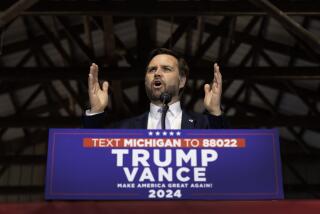Vance Hartke, 84; Indiana Senator Opposed Johnson on Vietnam
- Share via
Vance Hartke, the first three-term Democratic U.S. senator from the Republican-leaning state of Indiana, who helped President Lyndon B. Johnson pass his Great Society legislation but split with Johnson over the Vietnam War, has died. He was 84.
Hartke, who had practiced law in Washington, D.C., since his defeat in 1976 by Sen. Richard Lugar (R-Ind.), died Sunday in Washington of heart failure. He had undergone open-heart surgery three years ago.
During his tenure from 1958 until 1976, Hartke, considered a liberal, worked with five presidents. “Johnson was by far and away the one I admired most,” he told the South Bend (Ind.) Tribune in 1998, looking back on his long career brought down by the Vietnam controversy.
Hartke, a former mayor of Evansville, Ind., initially was a political and personal friend of Johnson, but after voicing opposition to escalating the war in Vietnam in 1965, Hartke became the butt of such Johnson insults as “two-bit mayor from a two-bit town.”
Despite warnings from his wife, Martha, and political insiders that a “hawk” was more popular than a “dove” in Indiana and in Washington, Hartke continued to oppose the war and briefly declared himself an antiwar presidential candidate for the 1972 election.
Lugar, who has since become a respected statesman and expert on foreign policy, trounced Hartke in 1976.
“Some people have never forgiven me for being opposed to the war,” Hartke said in the 1998 interview. “They thought it was wrong to be opposed to the president. They said, ‘My country, right or wrong.’ I thought it was a responsibility to point out where we were wrong.”
Asked then if he felt vindicated by more recent views that the Vietnam War was a mistake, Hartke said, “More sorrow than vindication. I feel sorrow because I think that dark shadow of Vietnam still hangs over this country.”
He remained proud of the legislation he helped create, much of it within Johnson’s Great Society plan. Hartke was credited particularly with legislation providing more affordable treatment of kidney disease, including dialysis machines, which has saved an estimated half a million lives.
Hartke also helped craft laws creating student loan programs, Veterans Affairs benefits, and Amtrak and Conrail. As chairman of a transportation subcommittee, he worked for safer automobiles and was named man of the year by the Automobile Owners Action Council.
Modeling the program on the Peace Corps, he also created the International Executive Service Corps, an organization that worked with retired U.S. businessmen sent to poor countries to help small businesses grow.
Born in the coal mining town of Stendal in Southern Indiana, Hartke served in the Navy and Coast Guard during World War II. He graduated from Evansville College and the Indiana University Law School before becoming an attorney in Evansville.
In 1956, he was elected mayor of Evansville, and in 1958, largely because of state highway scandals, was able to defeat Republican Gov. Harold Handley for a seat in the U.S. Senate.
Although he maintained close contacts with his native state, Hartke remained in the Washington area after his bitter political defeat. His children had grown up and settled there, he said, and he wanted to remain close to them.
Hartke is survived by his wife of 60 years; four sons; three daughters; and 16 grandchildren.
Plans for his funeral and burial at Arlington National Cemetery are pending.
More to Read
Get the L.A. Times Politics newsletter
Deeply reported insights into legislation, politics and policy from Sacramento, Washington and beyond. In your inbox twice per week.
You may occasionally receive promotional content from the Los Angeles Times.










